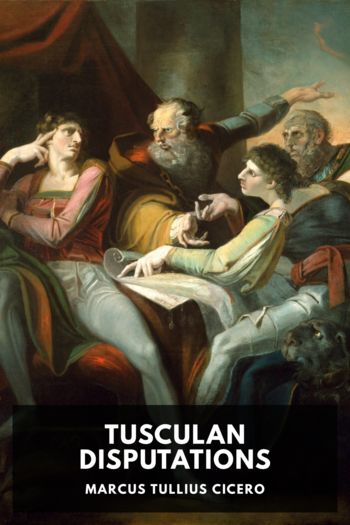Tusculan Disputations - Cicero (red novels TXT) 📗

- Author: Cicero
Book online «Tusculan Disputations - Cicero (red novels TXT) 📗». Author Cicero
But let everyone defend his own opinion, for everyone is at liberty to choose what he likes. I shall keep to my old custom and, being under no restraint from the laws of any particular school, which in philosophy everyone must necessarily confine himself to, I shall always inquire what has the most probability in every question, and this system, which I have often practiced on other occasions, I have adhered closely to in my Tusculan Disputations. Therefore, as I have acquainted you with the disputations of the three former days, this book shall conclude the discussion of the fourth day. When we had come down into the Academy, as we had done the former days, the business was carried on thus:
M. Let anyone say, who pleases, what he would wish to have discussed. A. I do not think a wise man can possibly be free from every perturbation of mind. M. He seemed by yesterday’s discourse to be free from grief, unless you agreed with us only to avoid taking up time. A. Not at all on that account, for I was extremely satisfied with your discourse. M. You do not think, then, that a wise man is subject to grief? A. No, by no means. M.But if that cannot disorder the mind of a wise man, nothing else can. For what—can such a man be disturbed by fear? Fear proceeds from the same things when absent which occasion grief when present. Take away grief, then, and you remove fear.
The two remaining perturbations are: a joy elate above measure, and lust. And if a wise man is not subject to these, his mind will be always at rest.
A. I am entirely of that opinion. M. Which, then, shall we do? Shall I immediately crowd all my sails? or shall I make use of my oars, as if I were just endeavoring to get clear of the harbor? A. What is it that you mean? For I do not exactly comprehend you. M. Because Chrysippus and the Stoics, when they discuss the perturbations of the mind, make great part of their debate to consist in definitions and distinctions, while they employ but few words on the subject of curing the mind, and preventing it from being disordered. Whereas the Peripatetics bring a great many things to promote the cure of it, but have no regard to their thorny partitions and definitions. My question, then, was whether I should instantly unfold the sails of my eloquence, or be content for a while to make less way with the oars of logic? A. Let it be so. For by the employment of both these means the subject of our inquiry will be more thoroughly discussed. M. It is certainly the better way. And should anything be too obscure, you may examine that afterward. A. I will do so. But those very obscure points you will, as usual, deliver with more clearness than the Greeks. M.I will, indeed, endeavor to do so. But it well requires great attention, lest, by losing one word, the whole should escape you. What the Greeks call πάθη we choose to name perturbations (or disorders) rather than diseases, in explaining which I shall follow, first, that very old description of Pythagoras, and afterward that of Plato, for they both divide the mind into two parts, and make one of these partake of reason and the other they represent without it. In that which partakes of reason they place tranquillity, that is to say, a placid and undisturbed constancy; to the other they assign the turbid motions of anger and desire, which are contrary and opposite to reason. Let this, then, be our principle, the spring of all our reasonings. But notwithstanding, I shall use the partitions and definitions of the Stoics in describing these perturbations, who seem to me to have shown very great acuteness on this question.
Zeno’s definition, then, is this: “A perturbation” (which he calls a πάθος) “is a commotion of the mind repugnant to reason, and against nature.” Some of them define it even more briefly, saying that





Comments (0)